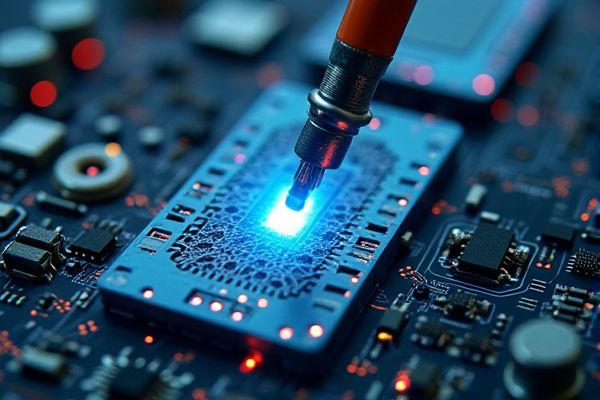
Mechatronics engineering in Nigeria offers a diverse range of job opportunities across various sectors, including manufacturing, robotics, automation, and automotive industries. Companies are increasingly seeking skilled professionals who can integrate mechanics, electronics, computer science, and control engineering to optimize processes and enhance product development. The growing focus on technological advancement in sectors like energy, agriculture, and healthcare creates demand for mechatronics engineers capable of designing and maintaining complex systems. Job roles include automation engineer, robotics technician, maintenance engineer, and project manager, with opportunities for both entry-level positions and experienced professionals.
Job Description
Mechatronics engineering in Nigeria involves the integration of mechanical, electrical, and computer systems to develop advanced automated solutions. Your role may include designing and maintaining intelligent machinery, robotics, and control systems in various sectors, such as manufacturing, healthcare, and automotive industries. You will work closely with cross-functional teams to ensure efficient production processes and implement innovative technologies that improve performance and safety. Job opportunities can be found in both public and private sectors, with a growing demand for skilled professionals in fields like automation and smart technologies.
Requirement
Mechatronics engineering jobs in Nigeria typically require a Bachelor's degree in mechatronics, mechanical engineering, electrical engineering, or a related field. Employers often look for candidates with strong problem-solving skills, proficiency in computer-aided design (CAD) software, and experience with robotics and automation. Internships or practical experience in the field can significantly enhance your employability. Familiarity with programming languages, sensor technologies, and control systems is also beneficial for potential job seekers.
Salary and Perks Expected
In Nigeria, the average salary for a mechatronics engineer ranges from N2,000,000 to N4,500,000 annually, depending on experience and location. Entry-level positions typically offer salaries on the lower end, while those with several years of experience can command higher wages. Many employers also provide benefits, such as health insurance, transportation allowances, and opportunities for professional development. Your prospects for advancement in this field can lead to roles in management or specialized engineering, enhancing both salary potential and job satisfaction.
Similar Job Names
- Mechatronics Engineer
- Automation Engineer
- Robotics Engineer
- Control Systems Engineer
- Mechanical Design Engineer
- Electronics Engineer
- Embedded Systems Engineer
- Manufacturing Engineer
- Systems Analyst
- Product Development Engineer
- Maintenance Engineer
- Research and Development Engineer
- Project Engineer
- Quality Assurance Engineer
- Technical Sales Engineer
Job Expectation Concept
Mechatronics engineering in Nigeria focuses on the integration of mechanical engineering, electronic systems, computer control, and systems design, fostering innovation in various sectors. A career in this field offers opportunities to work on robotics, automation, and smart manufacturing, addressing local challenges such as infrastructure development and technological advancement. Professionals are expected to possess strong problem-solving skills, adaptability, and a collaborative mindset to thrive in Nigeria's evolving industrial landscape. Engaging with interdisciplinary teams can enhance your ability to contribute meaningfully to a wide range of projects, ultimately benefiting the nation's economic growth.
Career Advantage and Weakness
Mechatronics engineering offers significant career advantages in Nigeria, where rapid technological advancement and manufacturing growth create ample job opportunities. The blend of mechanical, electronic, and software engineering skills positions you for diverse roles across various industries, including robotics, automation, and automotive sectors. A potential weakness in this field is the limited number of specialized training programs, which may result in a high competition among job seekers for available positions. Continuous self-improvement through certifications and hands-on experience can help mitigate this challenge and enhance employability.
Important Thing Must Know
Mechatronics engineering combines mechanical, electronic, and computer engineering, making it a versatile field with substantial career opportunities in Nigeria. Industries such as manufacturing, robotics, automotive, and telecommunications frequently seek skilled professionals to enhance automation and improve system efficiency. The job market often emphasizes practical experience alongside academic qualifications, so internships or hands-on projects can greatly enhance your employability. Networking with industry professionals and joining relevant associations can provide valuable insights and job leads. As Nigeria continues to advance in technology and innovation, mechatronics engineers play a crucial role in driving this progress, making their contributions highly impactful.
Alternative Career Options
Mechatronics engineering graduates in Nigeria can explore diverse career paths beyond traditional roles in manufacturing and robotics. Opportunities in renewable energy, such as solar panel installation and maintenance, are gaining traction due to the country's push for sustainable solutions. Positions in automation and control systems within the agricultural sector can leverage your skills to enhance productivity and efficiency. Additionally, the growing tech startup ecosystem in Nigeria offers roles in IoT and product design, where innovation is key to solving local challenges.
Companies List
- Siemens Nigeria
- Nigerian National Petroleum Corporation (NNPC)
- Shell Petroleum Development Company
- Dangote Group
- GE Oil & Gas
- Coca-Cola HBC Nigeria
- Nestle Nigeria
- Honeywell Flour Mills
- Julius Berger Nigeria
- Lafarge Africa plc
List of Ideal City
Lagos is a bustling hub for technology and innovation, attracting numerous multinational companies and startups in mechatronics engineering. Abuja, the capital city, offers opportunities in government agencies and research institutions that are increasingly investing in automation and robotics. Port Harcourt, known for its oil and gas industry, presents prospects for mechatronics engineers in energy systems and automation. Enugu, with its growing tech scene and emphasis on manufacturing, provides a favorable environment for advancing your career in this field.
 jobs-nigeria.com
jobs-nigeria.com